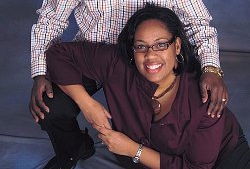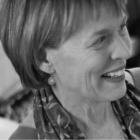How did you come to your specialty?
While working on my MA degree in organizational communication under the guidance of Dr. Leigh Arden Ford, I had the privilege of working with professors whose research projects highlighted ethnic relationships in the United States. A week after completing my thesis, at the urging of Dr. Ford, I started a doctoral program in communication studies at Bowling Green State University. My dissertation director, Dr. Warren, was conducting research in Whiteness Studies. Whiteness Studies identifies white as a racial category while at the same time shows how racial politics, regardless of one’s ethnicity, can contribute to a system of power and domination. Although my dissertation research was on body image and African American women, my interests went well beyond this topic. Many influences, including my dissertation director, my training at WMU,and my experiences as a feminist researcher and an African American female scholar, and as a colleague and friend to academics from all walks of life led me to the conclusion that the word “discrimination” is misplaced if we only see it in terms of Black and White. This understanding has led me to work with a wide variety of discrimination issues.
How would you expand the definition of discrimination?
I would like to define diversity as broadly as possible because all discrimination against diversity, whether conscious or unconscious, is equally harmful to individuals and ultimately to the community at large.
I believe that academics certainly need to embrace difference, diversity, or whatever term we choose to label it. However, in order to do that, we must be clear about our personal as well as our institutional and departmental definition of diversity. We need to ask ourselves if the terms diversity or minority only apply to a human being with a particular skin tone or if we also need to recognize cultural or ethnic tendencies which can include dialect, accent, regional or cultural norms and traditions, adherence or nonadherence to institutional or departmentally set values, teaching styles, or in-group affiliation. In other words, do we want to boil diversity down to “colored” bodies that are publicly visible for the sake of our institutional image while at the same time denying the individual the right to belong to other cultural traditions?
For example, one of my mentors is a Korean professor with perfect English, but with an accent. Students complained to me because they said that it was not as easy to understand her. However, with practice and exposure to different accents, students can learn regardless of the instructor’s accent and not use the accent as a way to diminish the professor’s ability or academic capacity. I believe students need exposure to people from different cultures and with different accents as well as different ideas that challenge what we see as normal. Because she is a woman and Asian, I felt that this was a type of discrimination against her and always encouraged student to listen beyond the accent. I do the same thing with my students today if they complain of a professor’s teaching style. I tell them, when you walk into another classroom, you may be walking into a different culture because many of us teach from our own cultural patterns and it may not be what the students have experienced before.
What would you like Christians to understand about your field?
Workplace discrimination can come in many forms and as Christians we should not be afraid to confront these issues head on as we have not been given the spirit of fear but of power, love, and of a sound mind (2 Timothy 1:7). As disciples of Christ we must stand up for the truth with forgiveness and love, with faith that God is in control and will take any seemingly negative circumstance and turn it into a blessing (Genesis 50:20). As Christians we need to speak not just for ourselves but for those around us who we see being oppressed, exploited, or discriminated against because they are “different.”
Standing up for what is right can take many forms and only you can decide your plan of action. Whatever happens, know that you are not alone, even though you might feel like you are. God will meet you along the way. He is your ultimate boss. Do not worry about what others may think about you or what they think about what you are doing or not doing because your primary purpose is to please God, your true judge. Remember that we are in the world but not of the world. You must be able to maintain your own moral compass, your integrity, and your values wherever you are and God will be with you (Romans 8:28–31).
In the face of discrimination, we as Christians are required to be slow to anger and be very careful in our judgment. We must realize that any claim of discrimination based even on a few individuals can hurt an organization or institution full of people that are supportive of diversity in its true sense. But we must also respect those who claim discrimination, though we may not see it. Often the acts of discrimination are more implicit in nature and often played out through subtle verbal and nonverbal communication. This can cause frustration and distrust toward colleagues and trouble on the academic path to tenure and promotion.
I would also like to mention that there are always two sides to a story — whether it’s the teacher complaining about the student, the student complaining about the professor, or one colleague complaining about another. None should be denied the right to express and discuss in meaningful ways his or her experience within academe or their workplace environment in order to foster cooperation and democracy instead of competitiveness and hypocrisy. In other words, individuals should have the right to express their experiences of discrimination, even if the listener believes that these are false perceptions because it is that individual’s perception, not yours, that matters if you want to be a part of creating harmony among diverse individuals. As such, not only do we all have a right to our perception but by claiming that a certain kind of discrimination does not exist when someone has claimed to experience it is to deny that person their experience. If we hear with openness another person’s experience of discrimination, it opens the door to resolving the problem and to potentially creating a space that is safe and encouraging for that person and others. Silencing someone’s opinion or version of events or speaking for them and not with them is a form of discrimination and that does not have a color.
What have been the challenges of teaching at a community college?
To go from conducting research to teaching students from all walks of life was a challenge! I teach five classes and serve on campus-wide committees so I am very busy. My husband is a public accountant living in Ohio while I am here in Pennsylvania. So, travel to see each other takes time as well.
What opportunities have you found teaching at a community college?
I have especially appreciated working with first generation college students — those whose parents did not go to college and have little knowledge of the college experience. As a first generation student myself, I can understand some of their challenges. I have found that first generation male students can have an especially hard time. I have had some first generation students I have called when I have not seen them in class for a few days. As well, when I see them in the hallway after they have taken my class I am sure to say hello and tell them that I am happy to see them. If they know they are missed, that someone cares and is reaching out, it can make a big difference.
I have also been able to continue my research. I was asked to take the lead on writing a chapter on defining diversity by interviewing minority women entering tenure track positions at majority institutions, highlighting the experience of Asian women. We found that the transition from female minority student to female minority colleague had surprising challenges in higher education. At the time, I was just beginning my tenure track position and teaching my first communication theory class in which writing and research were necessary components. I was able to teach my students how research, theory, and practice are interdependent and I was able to model this for my students.
I am happy to say that our chapter, among several others in the book, is scheduled to go to print in July 2011. The book is titled Still Searching for Our Mothers’ Gardens: Experiences of New, Tenure-Track Women of Color at ‘Majority’ Institutions, published by University Press of America. You can find more information at the book’s facebook page.
What do you do to sustain your spiritual life?
I grew up Baptist. In graduate school I was part of InterVarsity’s graduate student fellowship. That was a wonderful time. It has been more difficult to find that kind of fellowship after graduate school. I have now gone through catechism to join the Catholic church as my husband and his family, all from Ghana, are Catholic. I read the Bible and now attend Mass. I have always loved the spiritual practices, especially during Lent.
How has your experience of commuting between your husband and work been for you?
We see each other about once a month, but that is going to change. My mother died recently and this has made me more aware of how short our time is and what is most important in life. I have recently been granted a year leave to live in Ohio. During that time, my husband and I will be looking for a way to both have work in the same vicinity.
What else would you like to say to our readers?
Life is short and following the death of my mother to cancer in January and more recently the loss of my dissertation advisor, John T. Warren, to cancer, I realize that faith, family, and friends are the most important aspects of life to cultivate. My mother was my rock and John taught me to critically see oppression and the ways in which the oppressor is also oppressed in this human journey that we all share, and that we can only be free from oppression by working together. They both have given me the tools I need to meet and overcome challenges in my life but with a concern and passion to help others along the way.




